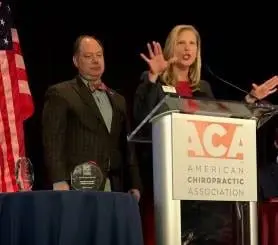NWHSU Q&A: Dr. Michelle Maiers Explains the Push for a Minnesota Massage License

Dr. Maiers recently traveled to Washington, D.C. to lobby for the chiropractic profession. Read more.
For more than a decade, Northwestern Health Sciences University faculty and administrators have advocated for a state-level license for massage therapy in Minnesota. Now, in February 2020, the state legislature is considering a bill that would set standards for all therapists practicing in our state and establish a Minnesota massage license.
Michele Maiers, D.C., Ph.D, MPH, Executive Director of Research and Innovation at NWHSU, explains the benefits that a well-written state licensing law could have for the massage therapy profession.
NWHSU: What exactly does the new bill, HR 3575, do for massage therapy licensure in the state of Minnesota?
Dr. Maiers: Minnesota is one of only a few states that do not licensed massage therapists or bodywork providers. This bill would establish a mechanism to license massage therapists at the state level. It establishes board oversight of the profession, and sets requirements for what is required for someone to be acknowledged as a licensed massage therapist in the State.
NWHSU: Why is this bill important?
Dr. Maiers: It’s important on two different fronts. First, not having a licensed profession can create confusion in the market if there is no standard for what constitutes a massage therapist. Massage therapy has been conflated with human trafficking in Minnesota and many other states. Having professional licensure helps ensure that patient safety is protected, and gives law enforcement a clearer way of identifying human trafficking and separating that from legitimate healthcare professionals doing massage.
Second, having a formal license for the profession would allow massage therapy to be included in state and federal programs that are directed toward healthcare professions. These are important for increasing patient access and cultural legitimacy within the healthcare system.
NWHSU: How has Northwestern Health Sciences University been involved with this legislation?
Dr. Maiers: NWHSU has been advocating for a massage therapy licensure for well over a decade. In relation to this specific bill, we have hosted meetings for several years that brought together a range of massage therapy stakeholders—schools in Minnesota, national associations, local chapter representatives—to try to come up with shared language that is suitable for everyone. We continue to collaborate on suggestions for amendments to H.R.3575, which we feel will strengthen the impact of this bill and make Minnesota’s among the best licensure bills in the nation.
NWHSU: Now that the bill has been introduced, what happens next?
Dr. Maiers: The bill will go through a series of committee hearings. That’s the opportunity for the public, stakeholders, and policymakers to express support or make improvements to the bill. We will be very active in that process.
NWHSU: If massage therapy students, working professionals, or NWHSU alumni are interested in supporting the bill and the school’s efforts, what can they do?
Dr. Maiers:They can contact their State representative in the house and express support for a massage therapy licensure bill. From our perspective, we think it’s important that this bill reflect educational standards established by accrediting agencies for massage therapy. That is language we look forward to seeing in revised versions of this bill. Students, alumni, and stakeholders should emphasize with their representative the importance for massage therapists to be graduates of accredited academic institutions like Northwestern Health Sciences University.